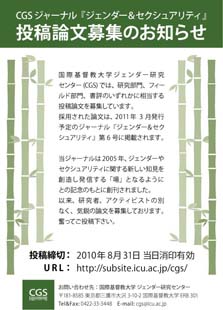
The Center for Gender Studies, International Christian University, welcomes submission of unpublished research papers, field repots and book rebiews. Articles currently received will be considerd for inclusion in the forth issue scheduled for publication in March 2011.
Submission Deadline: August 31, 2010
Journal Regulations for vol. 06
Launched in 2005, the CGS journal, Gender and Sexuality, is designed to bring together researchers and activists from theoretical and practical collaboration, and to disseminate information from Japan and Asia to the world. It is our hope that this journal will become an innovative, dynamic forum for challenging existing concepts and stimulating lively debate.
 CGS Tea Party
CGS Tea Party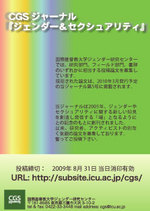

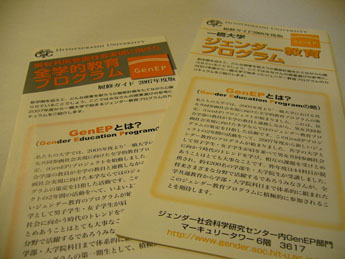
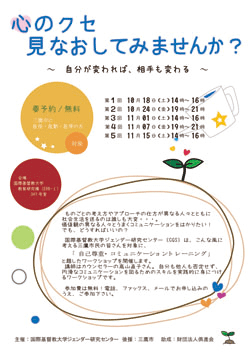
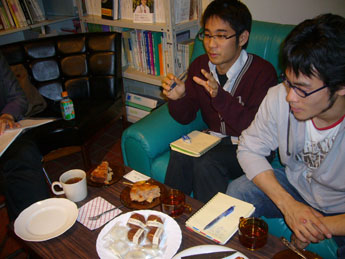
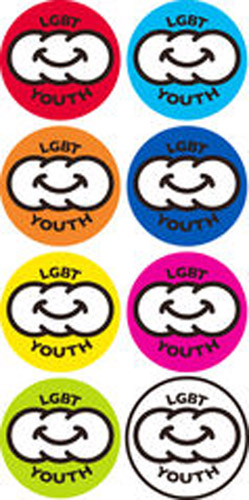 The situation for LGBTs has seen great change in the last five years. In the UK, legislation has been passed to prevent discrimination based on sexual orientation and same-sex couples have been granted similar legal rights to those of heterosexual married couples. In Japan, an assembly member has publicly come out as a lesbian and there are many LGBT groups which are becoming more and more active.
The situation for LGBTs has seen great change in the last five years. In the UK, legislation has been passed to prevent discrimination based on sexual orientation and same-sex couples have been granted similar legal rights to those of heterosexual married couples. In Japan, an assembly member has publicly come out as a lesbian and there are many LGBT groups which are becoming more and more active.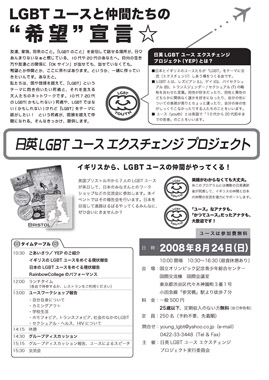 When it is hard enough to meet other LGBT young people in our own countries, why do we cross over borders trying to meet others who live thousands of miles away? Paradoxically this is the very reason why we are holding this LGBT youth exchange. The exchange creates a space for young people and all involved to find themselves as well as each other in societies where heteronormativity and gender stereotyping attempt to wipe out and disadvantage the existence of any nonconformist. Additionally, being young makes LGBT youth a minority in LGBT communities. While coming-out is still a big issue for most LGBTs, it is even harder for young people to do so when their lives are dependent on parental care. This is still the case, not only in Japan, but also in the UK.
When it is hard enough to meet other LGBT young people in our own countries, why do we cross over borders trying to meet others who live thousands of miles away? Paradoxically this is the very reason why we are holding this LGBT youth exchange. The exchange creates a space for young people and all involved to find themselves as well as each other in societies where heteronormativity and gender stereotyping attempt to wipe out and disadvantage the existence of any nonconformist. Additionally, being young makes LGBT youth a minority in LGBT communities. While coming-out is still a big issue for most LGBTs, it is even harder for young people to do so when their lives are dependent on parental care. This is still the case, not only in Japan, but also in the UK.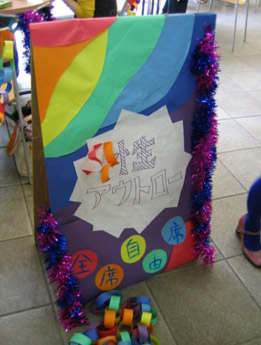 When I was a high school student in Japan, I was a closeted gay. I don’t think I even had that word - gay - to identify myself as. I knew the word “homo” and only revealed my sexuality in online forums. I had no idea how my friends and parents would respond if I came out because I had never seen anyone come out. I was comfortable with my sexuality but it was not until I left the country that I could tell my mother and my best friend that I was sexually/romantically attracted to men rather than women. I sometimes wonder, if I had not moved to New Zealand at the age of seventeen, would I have ever been able to come out? In a high school in Japan? I don’t think so.
When I was a high school student in Japan, I was a closeted gay. I don’t think I even had that word - gay - to identify myself as. I knew the word “homo” and only revealed my sexuality in online forums. I had no idea how my friends and parents would respond if I came out because I had never seen anyone come out. I was comfortable with my sexuality but it was not until I left the country that I could tell my mother and my best friend that I was sexually/romantically attracted to men rather than women. I sometimes wonder, if I had not moved to New Zealand at the age of seventeen, would I have ever been able to come out? In a high school in Japan? I don’t think so.